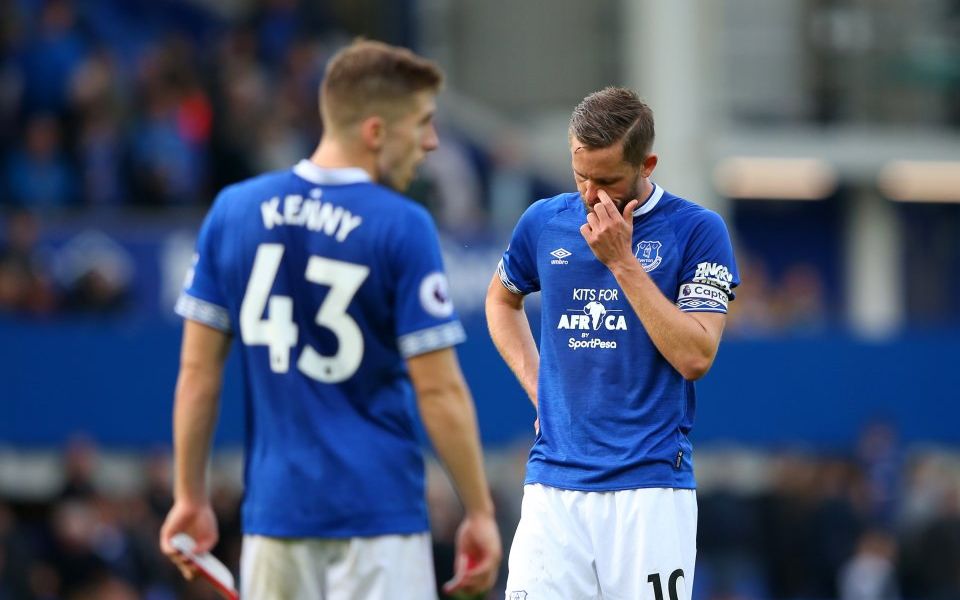Big-spending Everton still seeking lift-off in mission to challenge Big Six

When Iranian billionaire Farhad Moshiri purchased a 49.9 per cent share in Everton two and a half years ago, his intention was to ensure the club challenge for Champions League football.
Yet as Pierre-Emerick Aubameyang stroked home Arsenal's second goal at Emirates Stadium on Sunday and condemned the Blues to their second Premier League defeat of the season the team had seldom looked further away from fulfilling those aspirations.
Everton are preparing to play Fulham at Goodison Park on Saturday. The newly-promoted west London club play an attractive, open style that should provide the Merseysiders plenty of opportunities to attack, and a chance to atone for a chastening 3-1 defeat to West Ham in their previous home fixture.
But regardless of whether they put Fulham to the sword this weekend or not, it has been an unremarkable start for Everton. They currently have six points, and languish closer to relegation than continental football in 12th place. Their current standing in the table may only be reflective of half a dozen matches so far, yet it is also highlights real shortfalls at the club over the past few years.

Everton were well-beaten by West Ham in their previous home fixture at Goodison Park (Source: Getty)
Everton's intentions may be obvious but their strategy continues to be unclear almost three seasons after Moshiri's arrival. It's not as if they haven't tried to progress. The club have signed 32 players since May 2016 and spent nearly £300m on transfer fees, recording the sixth highest net spend in the Premier League over the past five years – behind only Arsenal, Chelsea, Liverpool, Manchester United and Manchester City. Still, they finished 26 points outside the Champions League places last season, well behind local rivals Liverpool in fourth.
The scatter-gun nature of their approach can be seen upstairs away from the football pitch. They hired Steve Walsh as director of football two seasons ago from title winners Leicester City, where he was credited with spotting formerly obscure talents like Riyad Mahrez, N'Golo Kante and Jamie Vardy, with the expectation of similar success on Merseyside.
However, rather than unearthing comparable gems in the residue of the continent's lower leagues, Everton committed to purchasing fairly well known faces from established sides, including a disastrous transfer period in 2017 when the club procured three No10s – Gylfi Sigurdsson, Wayne Rooney and Davy Klaassen – for an outlay of £80m. Walsh was replaced at the end of last season by PSV director of football Marcel Brands, and over the summer the club committed vast sums to signing Watford winger Richarlison and Barcelona spare man Yerry Mina.
Read more: Farhad Moshiri purchases 49.9pc of Everton
There also has been little consistency with their approach to managerial appointments. Roberto Martinez, a manager who prides himself on possession football, was sacked near the end of the 2015-16 season with the club marooned in mid-table and replaced with the more pragmatic Ronald Koeman. He was then sacked a year later with the club flirting with the bottom three and relegation fire-fighter Sam Allardyce was brought in, bringing his favoured direct, set-piece focused style to Merseyside which went down like a lead balloon with the Goodison Park faithful.

Everton hired Marco Silva this summer after a nine-month pursuit of his signature but the jury remains out on whether he can succeed in the Premier League (Source: Getty)
Moshiri increased his stake in the club to 68 per cent in September and hired new manager Marco Silva. The club's first choice to replace Koeman had been in charge of Watford 10 months earlier when Everton made their intentions clear. Their approach was rebuffed, Allardyce was reluctantly roped in to stem the bleeding, and Watford summarily sacked Silva after an alarming drop in the team's form.
Silva places great emphasis on pressing, vertical passes and width, all of which are ideals that would appease Everton's fans. However, their flaccid performances against West Ham and Arsenal displayed few of those ambitions and lacked competitiveness, with the team fading in both games as soon as the opposition consolidated their leads in the second half.
Read more: How to invest like a Premier League football manager
There are still question marks over Silva, whose first Premier League job at Hull ended in relegation. He has won only 18 out of 55 games in all competitions in England across three clubs, and the jury is out on whether his successful spells abroad at Sporting Lisbon and Olympiacos, which both ended in boardroom battles, have equipped him to compete for continental football with this Toffees side.
Everton may have finished seventh and eighth in the past two seasons, but they have failed to match the achievements of long-standing manager David Moyes who left five years ago and operated on a much tighter budget alongside chairman Bill Kenwright. There have been no accomplishments to rival qualifying for the Champions League in 2005 and reaching the FA Cup final in 2009 so far under Moshiri's stewardship.
As the season reaches the colder months of late autumn, Moshiri will want to see this situation rectified – starting against Fulham on Saturday.